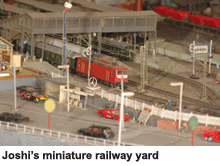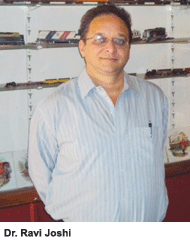An engineer by profession and Pune’s ‘railway man’ by popular reputation, Dr. Ravi Joshi has combined his skills and knowledge of mechanical and electrical engineering to build one of the biggest and most ‘active’ railway museums in the country. The Joshi Museum of Miniature Railways in Kothrud, suburban Pune, is served by a huge platform built to accommodate an entire miniature city controlled from a panel commanding a network of over 1,000 wires which if laid end-to-end, would cover a distance of 5 km.
 In this imaginary miniature city, there are 65 signals, 26 points, fences, lamp posts and flyovers apart from moving miniature steam trains, diesel engines, high-speed inter-city express trains, an underground train, a trolley bus, rope, funicular and hanging railways. There’s also a fully functional station yard with six platforms, announcement systems, three main lines, goods loading facilities, hump shunting, a turntable, crane etc. Other features include a ghat section with a reversing station for steam trains, a two-lane highway with moving cars, a fairground with a circus, ferris wheel, merry-go-round, roller coaster and other attractions, all with sound effects.
In this imaginary miniature city, there are 65 signals, 26 points, fences, lamp posts and flyovers apart from moving miniature steam trains, diesel engines, high-speed inter-city express trains, an underground train, a trolley bus, rope, funicular and hanging railways. There’s also a fully functional station yard with six platforms, announcement systems, three main lines, goods loading facilities, hump shunting, a turntable, crane etc. Other features include a ghat section with a reversing station for steam trains, a two-lane highway with moving cars, a fairground with a circus, ferris wheel, merry-go-round, roller coaster and other attractions, all with sound effects.
An alumnus of Fergusson College with a doctorate in computer aided learning from the University of Pune (1992), Joshi’s railway museum features on Pune’s tourism map. Nevertheless he is quick to give credit to his late father, B.S. Joshi, an engineer and keen model railway enthusiast who inaugurated the museum in 1998.
 Unfortunately, he didn’t live to see the tremendous public appreciation of his initiative. “I had to take the decision to either continue with the project or shut it down. I opted to carry forward my father’s work which was made easier by new computer technologies rather than the complex system of strings and pulleys he had to use,” recalls Joshi.
Unfortunately, he didn’t live to see the tremendous public appreciation of his initiative. “I had to take the decision to either continue with the project or shut it down. I opted to carry forward my father’s work which was made easier by new computer technologies rather than the complex system of strings and pulleys he had to use,” recalls Joshi.
The potential and possibilities of miniature railway models impacted Joshi when he attended an exhibition on toys and railway modeling in Germany in 2002. “There are about 400 companies manufacturing toy trains and accessories in Germany and every third family has a set of trains at home. This is a hobby that involves several branches of engineering and science as well as photography, economics, management and administration,” he says.
The museum which hosts around 400 visitors per week is currently in the process of a major revamp. It will be fully automated within six months, and the shop selling miniature railway kits and raw materials will be much larger. “We want to reach out to more people, especially schools and colleges, by conducting workshops on miniature railway-modeling. I especially want more children to have the option of indulging in this highly educational hobby,” says Joshi.
All aboard!
Huned Contractor (Pune)